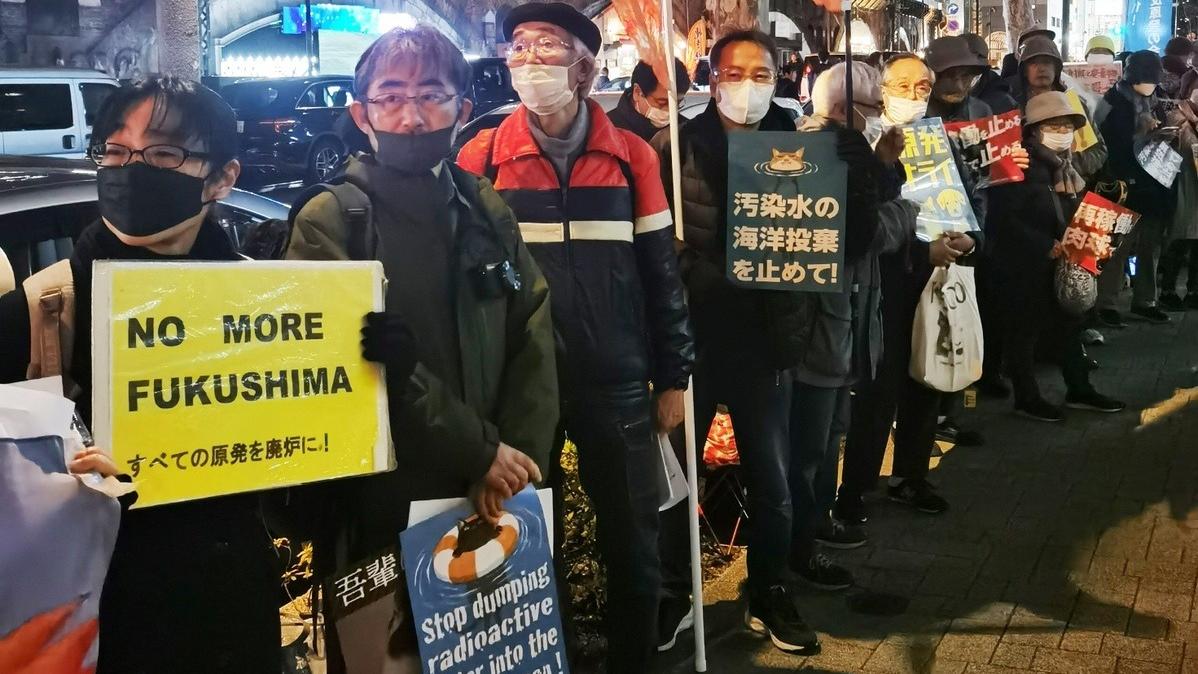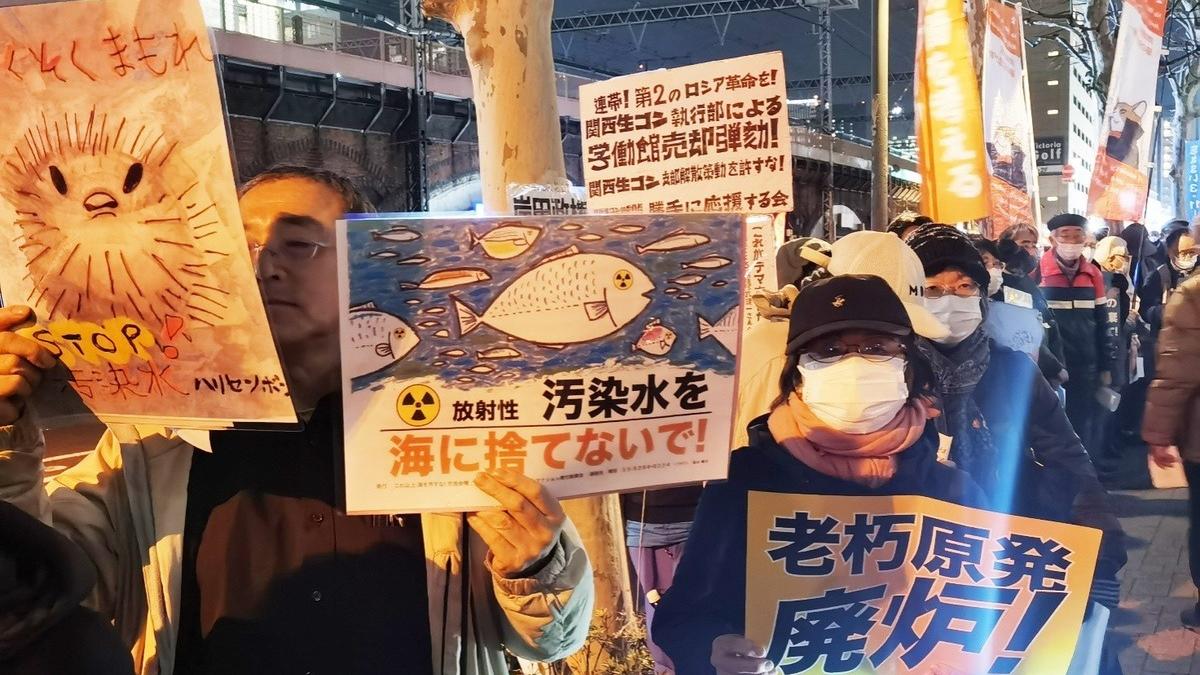 Japanese citizens rally in front of the headquarters of the Tokyo Electric Power Company in Tokyo late on Monday, demanding an immediate cessation of the ocean discharge of nuclear-contaminated water. (JIANG XUEQING / CHINA DAILY)
Japanese citizens rally in front of the headquarters of the Tokyo Electric Power Company in Tokyo late on Monday, demanding an immediate cessation of the ocean discharge of nuclear-contaminated water. (JIANG XUEQING / CHINA DAILY)
More than six months after Japan started releasing Fukushima nuclear-contaminated water into the sea, its citizens still insisted on opposing the discharge during the visit of the head of the International Atomic Energy Agency, urging it to help end the water release.
Rafael Mariano Grossi, director-general of the IAEA, made a three-day visit to Japan as a guest of Japan’s Ministry of Foreign Affairs, starting on Tuesday.
Recently, there were two major accidents during the treatment process of the nuclear-contaminated water at the Fukushima plant, resulting in workers being severely exposed to highly radioactive water
He met with locals in Iwaki, Fukushima Prefecture, and visited the crippled Fukushima Daiichi nuclear power plant operated by the Tokyo Electric Power Company (TEPCO) on Wednesday.
READ MORE: IAEA chief stresses monitoring of Fukushima nuke water discharge
Iwaki resident Chiyo Oda told China Daily, “If I could meet the director-general of the IAEA, I would like to tell him, ‘Local residents do not want any further spread of radiation into the sea. I urge you to stop TEPCO from discharging contaminated water into the ocean.”
The IAEA’s impartiality and independence have been distorted by the Japanese media, with the phrase “seal of approval” being bandied about in media reports.
Oda said the phrase misrepresented the IAEA’s stand.
In fact, the IAEA has not given its approval for the discharge of Fukushima’s contaminated water. What the agency actually said is that it will not oppose the discharge because it is something the Japanese government has already decided, said Motoo Tomizuka. He is a member of No Nukes Plaza Tokyo, a nonprofit citizens’ organization also known as Tanpoposya.
Recently, there were two major accidents during the treatment process of the nuclear-contaminated water at the Fukushima plant, resulting in workers being severely exposed to highly radioactive water.
“TEPCO lacks the ability to work safely and effectively,” Tomizuka said. “If the IAEA is going to monitor TEPCO’s sloppy work in treating contaminated water and urge for improvements, then there might be some meaning in Grossi’s visit.”
However, he said that he believes that there is no way to improve the safety of discharging the contaminated water into the ocean. “The best way is to stop the release,” he said.
One of the plaintiffs suing the Japanese government and TEPCO over the ocean discharge spoke to China Daily but declined to be named.
“I want to ask the director-general of the IAEA: ‘Even if there have been no immediate impacts in recent years, what are your thoughts on the potential long-term effects of pollution on the sea several decades from now? If such effects were to occur, how do you feel about the responsibility toward the future?’” she said.
Considering that the IAEA is an organization that promotes nuclear power, and the Japanese government has contributed significant amounts of funding to it in the past, the plaintiff said she does not believe that it is an organization that is impartial or independent.
“I believe an independent organization gathering experts from around the world, rather than the IAEA, should investigate and monitor the discharge of contaminated water into the sea. It is necessary to have them assess the safety,” said the plaintiff, who was born in Iwaki.
 Japanese citizens rally in front of the headquarters of the Tokyo Electric Power Company in Tokyo late on Monday, demanding an immediate cessation of the ocean discharge of nuclear-contaminated water. (JIANG XUEQING / CHINA DAILY)
Japanese citizens rally in front of the headquarters of the Tokyo Electric Power Company in Tokyo late on Monday, demanding an immediate cessation of the ocean discharge of nuclear-contaminated water. (JIANG XUEQING / CHINA DAILY)
Shuhei Matsushiro, a director of the Association for Inheriting and Propagating the Murayama Statement, stressed that releasing water that has touched melted nuclear material into the ocean is “unprecedented”.
His association is dedicated to upholding the 1995 Murayama Statement that admits Japan's wartime mistakes.
Releasing this water into the Pacific Ocean will harm neighboring countries such as China and South Korea, as well as Pacific Island countries
“TEPCO and the government claim that releasing tritium-contaminated water is safe, but it’s not just tritium. If debris is touched, nearly 200 nuclear substances will dissolve into the water, which cannot be removed even by the ALPS,” Matsushiro said.
The Advanced Liquid Processing System, or ALPS, is supposed to remove 62 radionuclides from the contaminated water.
Moreover, releasing this water into the Pacific Ocean will harm neighboring countries such as China and South Korea, as well as Pacific Island countries, he said.
“I’m deeply upset about the Japanese government pushing forward its nuclear power policy, ignoring voices from neighboring countries regarding the discharge of nuclear-contaminated water.”
The claims of China and South Korea are “absolutely correct, so I want people around the world to know that Japanese citizens share such sentiments,” Matsushiro told China Daily.
“It’s crucial for not only the Japanese government and organizations promoting nuclear power like the IAEA, but also for countries directly affected by these issues, to participate and take scientifically sound actions internationally to address this problem,” he said.
Hisataka Yamasaki, a co-representative of No Nukes Plaza Tokyo, attended a rally in Tokyo on Monday. It was one of the events marking the 13th anniversary of the Great East Japan Earthquake and Tsunami in March 2011, which triggered one of the world’s worst nuclear accidents at the Fukushima power plant.
READ MORE: Japan to release 54,600 tons of Fukushima water in fiscal 2024
“Nuclear power plants are expensive structures but they aren’t necessarily designed to withstand huge earthquakes or tsunamis. In other words, the IAEA has a lower level of knowledge than Japanese scientists. It lacks the ability to assess this,” Yamasaki said.
He said that he believes that doing away with nuclear power plants is the only viable path for Japan and urged TEPCO to stop dumping nuclear-contaminated water into the ocean.
“The only solution is to stop releasing contaminated water. Even if monitoring continues while we keep releasing contaminated water, the spread of radiation won’t stop, so it won’t solve the problem,” Yamasaki said. “Instead, we should build large tanks inland to store contaminated water, and over time, the radioactive substances will decrease.”
Contact the writer at jiangxueqing@chinadaily.com.cn


